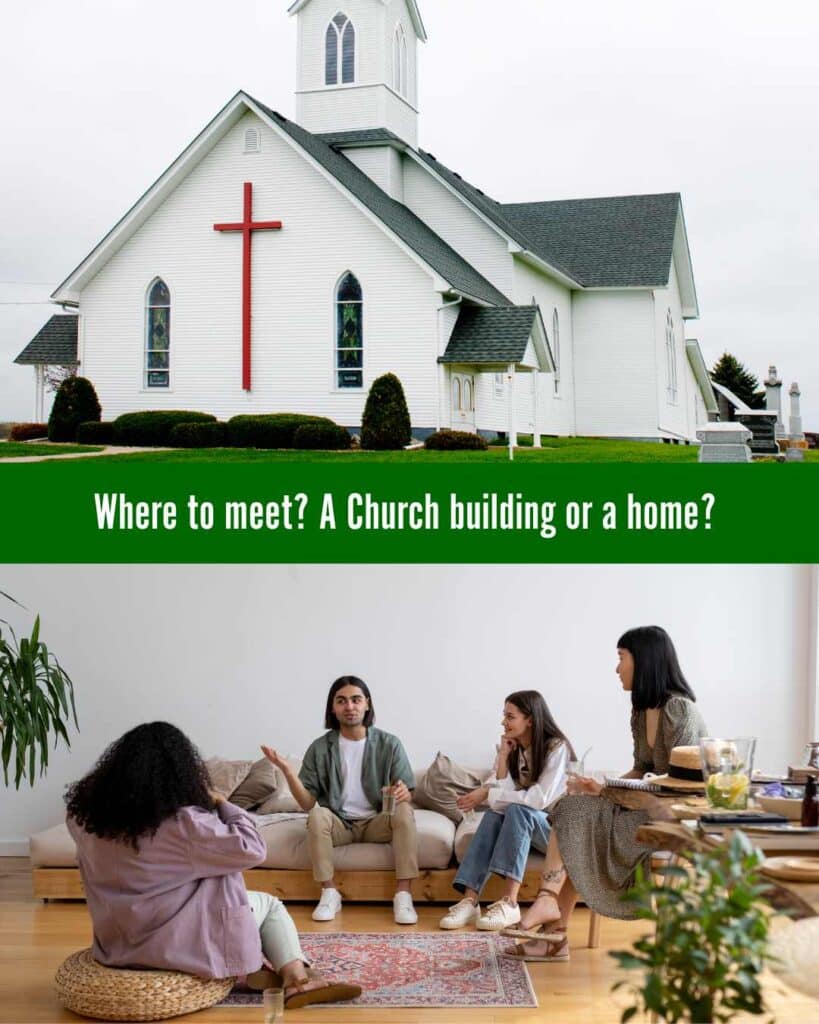“We’ve been looking for a place to have our Discovery Bible Study. I’m so excited! The pastor has said we can use the church! It solves our childcare problem, too. We can use the nursery area for the kids.” She sounded so happy. Inside, I cringed. “Oh no! That doesn’t sound like the best option. How do I help her avoid making this strategic mistake regarding meeting in a church building?” Gently, I began asking questions. Eventually, she began to see. It’s probably better not to have Discovery groups meet within the church building. Not if her goal is to multiply disciples among the unreached and start a Disciple Making Movement.
When you’ve grown up in a typical church environment with a building, this kind of advice might feel strange. Everything we do as multipliers and DMM practitioners must be reproducible. It must pass the reproducibility test.
Let me explain further.
Discovery groups (whether they are DBS, T4T, or story groups) have two primary goals;
1) to introduce people to Jesus who don’t know Him yet,
2) to train every disciple to make disciples themselves.
When deciding where to have your group meet, you need to ask these questions:
– Does this venue help us reach new people easily?
– Or could it be a barrier for them?
– Is the venue itself going to lend toward multiplication and second-generation groups?
– Or hinder that from happening?

When Renting a Building Harms a Movement
They had been meeting in homes for a few months. The houses were small. The people in the community were mostly day laborers. When they had more than ten people, the rooms were hot and crowded. This forced them to start new groups nearby. Instead of adding more people to the existing group, they started new groups when people showed interest. There wasn’t enough space to add people.
It was exciting to see the way the new groups were multiplying. Until they made a strategic mistake.
They’d begun to train the new disciples about giving. That was going well. The leaders were excited. They now had money to use for the growth of the movement.
They came to me and said, “Guess what? We found a room to rent! Now we can have a “real” church on Sunday mornings!”
I was glad that they at least were not looking outside for money as a source. I could see, however, that this action could have unseen negative implications on the growth they’d been experiencing. I wish I had been wrong about this.
They’d made the decision prayerfully, and as their coach, though I challenged them to think carefully about this, I was not going to tell them what to do. It had to be their decision.
After renting the building, within a few short months, multiplication stopped.
They shifted over from movement activities to becoming a traditional church. They met on Sunday mornings. People came to church, sat and listened, went home, and did little to apply what they learned.
The two or three key leaders slowly moved away from participatory Bible studies and began preaching. They got busy attending pastors conferences and meetings now that they were recognized by others as being a “church.”
Evangelism that had been their passion, in the beginning, slowed dramatically. They began to focus on developing youth meetings and women’s meetings and became a “Come church” instead of a “Go church.”
It was sad. They had begun with the potential to launch a movement. They had destroyed that, by their shift to a rented building.
… When Paul and Silas left the prison, they returned to the home of Lydia. There they met with the believers and encouraged them once more.
Acts 16:40 NIV.
5 Negative Implications For Multiplication, When You Meet in a Church Building
1. Participation decreases.
Houses usually have natural limits on the group size. Either the room is limited in size, or there are only so many chairs and places to sit, etc. This natural limitation is a good thing! If the room is packed full, it means you need to multiply the group. Stop adding new people. Start new groups in new homes.
Meeting in a house, coffee shop, or factory lunchroom naturally lends itself to a small size where everyone has a chance to participate. Each person is given time to answer discussion questions. When everyone participates, everyone is discipled and grows. Each person is accountable for obedience and putting what is studied into practice. Relationships go deeper. When you begin to meet in a church or building, this changes.
2. Church buildings have a stigma attached to them.
Homes or other venues are more neutral. Many have a hard time entering a church building. It may bring up negative emotions, or bad experiences they have had with Christians or church in the past.
If you are working among unreached people groups, or those from other faiths, going to a church building could cause persecution. If their family or others see them going there, they will ask many questions. If they say they are going over to someone’s house for tea this is avoided.
When your goal is to reach lost people, meeting in homes, or other neutral places is much easier. You may even want to avoid meeting on Sunday mornings or a traditional “churchy” time.
3. People tend to connect more deeply in smaller more relaxed settings.
A church classroom can feel sterile. Deep relationships of trust and caring develop more quickly in a relaxed environment. Classrooms are for teachers and students. You want to get away from that impression. Create discovery environments of mutual learning and sharing.
4. Children, youth, and unsaved neighbors or relatives are more likely to join in a home
As mentioned in a previous blog, in Disciple Making Movements (DMMs), we don’t separate children and youth into their own programs. We generally encourage them to learn and grow alongside their parents. They play a vital role in the community. This happens more easily in homes.
I’ve also seen, especially in Asia and Africa, that unsaved relatives who live in the same house, will listen in easily to a group that meets in a home. They can then be invited to participate in the learning, answer questions, and are drawn in. You miss this when you decide to rent a building or meet in a church.
5. Meeting in a church building could limit reproducibility.
Churches only have so many classrooms or halls. How will the groups multiply?
Even if it is a large church with many classrooms, eventually they will fill up. Then what will you do? Build more? You’ve already established a model of groups meeting in the church building. Shifting then to homes for the second-generation groups will be hard.
Always do things in the first generation church/group, the way you want it to look at the third or fourth generation. Your model must be easy for anyone to duplicate. Expect that each person in the group will eventually begin their own groups. Can that happen if you meet in a church building?
No Rules or Regulations- Only Principles
I hope this article has given you some things to consider as you think about where to meet. There are no rules or regulations about this. Meet in the place God leads you to. There is no right or wrong answer.
What other questions come to mind as you consider this issue?
I’d love to hear your thoughts on this in the comments below or in the Dare to Multiply Facebook group.



Comments
Great article. some years ago we, my husband and I went out from a mother church to plant a church in another area. Saddly, we commited the mistake of renting a building to gather the 3 small groups we were having. I have to recognize deep inside us, we wanted to show the other church that we were fructiferous. But remembering all this groups that were formed before that mistake, I praise God how the HS moved among a family of our neighborhood; many of that family came to know Jesus with miracles and power; one member of that family was married to a man who practiced witchcraf. That man died before I met the woman who was filled with fear and could not sleep. She came to know Jesus, me and hers sister went to her house and dedicated that house to God. Another member of that family had problems with her husband who was an alcoholic and he was very sick. God healed and saved him and with him all the family believed.
I love this teachings fir sure
Yes I have enjoyed the lesson
Strengths:
1. Practical and Contextual Relevance
The article is clearly written with a global missions context in mind, particularly among unreached people groups in Asia and Africa. It acknowledges social and cultural realities that make traditional church buildings problematic, such as persecution or social stigma.
2. Focus on Multiplication and Participation
The emphasis on participation and reproducibility is well-aligned with the core values of DMMs. The critique of large, impersonal gatherings helps reinforce the biblical model of relational, interactive discipleship (Acts 2:46; 2 Tim. 2:2).
3. Balanced Conclusion
The closing paragraph reminds readers that these are principles, not rigid rules. This nuanced approach avoids legalism and leaves room for Spirit-led flexibility.
Need to think!
1. Overgeneralization of Church Buildings
While church buildings can hinder certain types of outreach, the article paints them too negatively. It overlooks contexts where buildings serve as neutral, even welcoming, spaces—such as in many Western or urban settings where homes may not be open to outsiders.
2. Lack of Scriptural Depth
The article opens with Acts 16:40 but does not engage deeply with the broader New Testament context, where both homes and public spaces were used for ministry. For example, Paul often taught in synagogues and lecture halls (Acts 19:9).
3. Assumes One Model Fits All
Despite the disclaimer at the end, the tone throughout suggests that home-based gatherings are superior. A more robust critical approach would acknowledge the variety of ways God grows His church through diverse contexts, rural, urban, persecuted, or free.
Conclusion:
This article provides valuable insights for those engaging in grassroots discipleship and missions, especially in sensitive contexts. However, it would benefit from a more balanced view of ecclesiology, recognizing that both house churches and building-based churches can play vital roles in the Body of Christ. Multiplication depends more on vision, obedience, and relational depth than simply on the meeting location.
How to be part of this drive concerning what I have read through?
Reinhold Pious Fatorma from freetown, Sierra Leone, West Africa
I am very greatful with the comments above. I think it is secrete hidden to those worship in the temple church. The limit that meets outside, I mean those who are not members of the temple church is very wide. Some people afraid to join a temple church because some time it is not theirs. It is not belong to them, the community ignore the building because it is not the same to that of their culture. The house church simplify joining the temple.
Good to hear
Ummmmm powerfull ,
This has been very powerful to me and I thank God for you and for letting me get the information. Be richly blessed of the Lord Jesus Christ always.